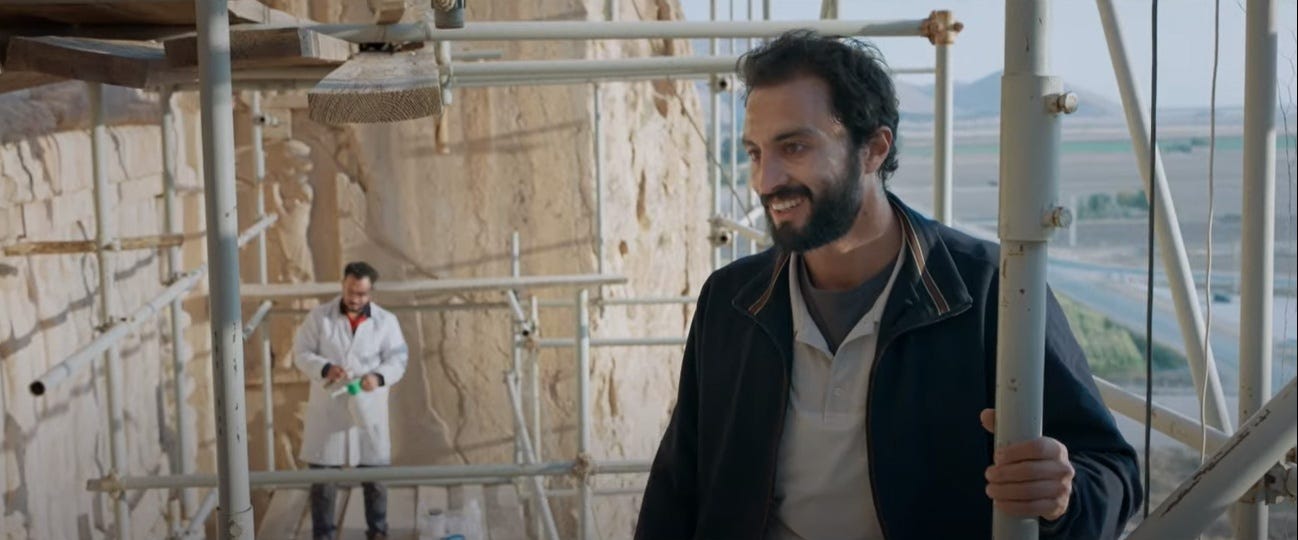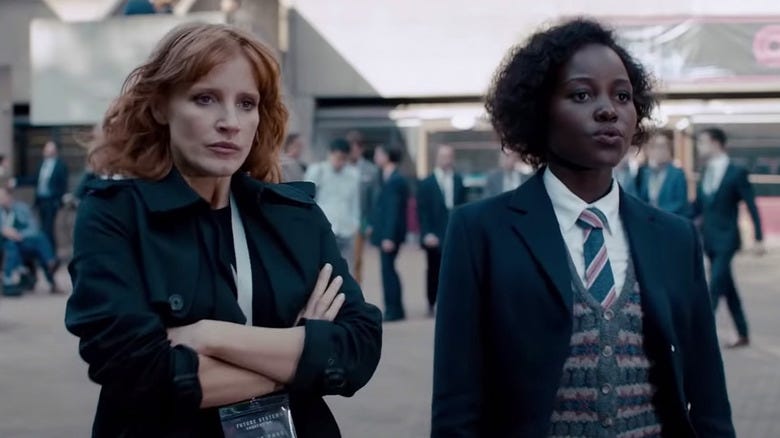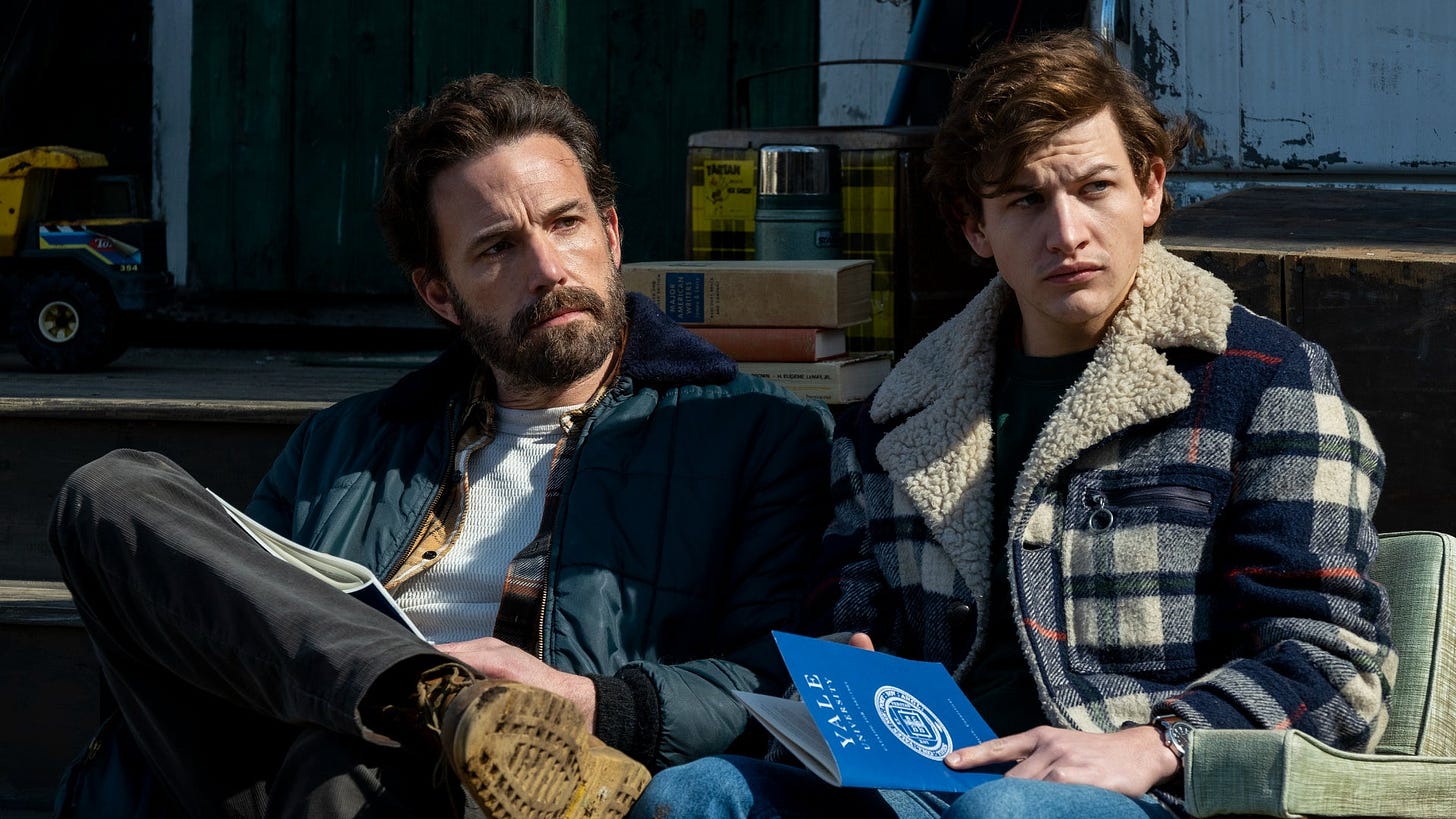In Review: 'A Hero,' 'The 355,' 'The Tender Bar'
Ashgar Farhadi returns with his greatest drama since 'A Separation'; Jessica Chastain, Lupita Nyong'o, and others team up to save the world; and George Clooney directs another snoozer.
A Hero
Dir. Ashgar Farhadi
127 min.
The tacit theme of Ashgar Farhadi’s films is the irreducibility of human beings, which is a fancy way of saying that About Elly, A Separation, The Past, and The Salesman are complex pieces of work, full of characters whose morality and decency are always context-dependent. Yet irreducibility is the explicit theme of his new film, A Hero, an astonishingly prismatic drama about a man who acts out of a murky combination of honor and self-interest, but faces judgment from those who need his motivations to be purer. Yet Farhadi makes certain that everyone else’s motives are murky and compromised, too, and cannot be understood in absolute terms. It may be our instinct to understand stories in terms of heroes and villains, but Farhadi, a peerless dramatist, seeks to defy those binaries at every turn.
The real villains in A Hero are the institutions that set these characters in conflict in the first place, starting with a justice system that relies on the aggrieved party to grant mercy. With a placid smile that curdles as circumstances turn against him, Rahim (Amir Jadidi) returns to the historic city of Shiraz, Iran, on a two-day leave from prison. Rahim is doing time for his failure to pay back a massive loan, but he’s found a source of money that he hopes will be enough to satisfy his creditor, Bahram (Mohsen Tanabandeh), and convince him to drop the charges. Rahim’s secret girlfriend, Farkhondeh (Sahar Goldust), has lucked into finding a woman’s handbag whose contents include 17 gold coins. When the exchange rate proves unfavorable, Rahim has a crisis of conscience about keeping the coins, so he posts notices looking for the woman who lost the bag.
When the Iranian media gets hold of this story, Rahim is depicted as a selfless man who gave back the gold that others would take for themselves, especially with their freedom at stake. Helping the human interest angle is that his son is a pitiable boy who stutters and has been doubly abandoned by his father’s divorce and incarceration. This naturally leads to strangers, inspired by Rahim’s actions, to give him material support and other parties, skeptical of certain details in the official account, to start investigating its veracity. Then there’s the matter of his creditor, who’s suddenly thrown into an unflattering light, because no one understands his own relationship to Rahim and the terrible impact this debt has had on his life, too.
The Reveal is a reader-supported newsletter dedicated to bringing you great essays, reviews and conversation about movies (and a little TV). While both free and paid subscriptions are available, please consider a paid subscription to support our long-term sustainability.
The moral of the story is that “No good deed goes unpunished,” except that isn’t the moral of the story, because the deed isn’t entirely good or bad. Rahim cannot be blamed for wanting to use these found coins to get out of prison, and it’s understandable why he’d play along with a narrative that’s not entirely true, because the stakes are so high. Had the coins been worth as much as he’d hoped, would he have given them back to their owner? Plainly not. Does that totally devalue his decision to return them anyway? It doesn’t. Am I going to stop using this rhetorical device now? Okay, fine, if you insist.
Social media has a role to play in A Hero, too, though Farhadi’s focus on characters who are not Extremely Online has the fascinating effect of revealing its impact indirectly. Critic A.A. Dowd of The A.V. Club likens A Hero to the “milkshake duck” phenomenon, which refers to viral sensations that wither under scrutiny, felled by the same forces that gave them notoriety. We don’t need Farhadi to show us Rahim as a trending topic to imagine how this story might be processed in people’s feeds, but he’s insightful about the flattening effect of public opinion when it comes to media narratives of any kind. It makes punishment disproportionate and justice impossible.
Yet Farhadi is above all a humanist, not a polemicist. There are lessons to be drawn from the magnificent mess he creates here, but the main one is a case of Farhadi leading by example: Treat people with a generosity of spirit, because there’s often more to their stories than meets the eye. He critiques our tendency toward oversimplification by clarifying the motives of his characters, whose lies are as heartbreakingly legible as their genuine moments of nobility. Much like A Separation, the small-scale tragedy in A Hero isn’t brought about through deliberate harm, certainly not with the children affected by collateral damage. His film expresses the thin hope that we can be slower to judge and more willing to understand. — Scott Tobias
A Hero opens in limited release this week. It starts streaming on Amazon Prime on Jan. 21.
The 355
Dir. Simon Kinberg
124 min.
The 355 is only an adequate spy thriller but an excellent answer to the following thought exercise: What if an extremely talented cast united to pay feature-length homage to the Luc Besson school of just-stylish-enough Eurothrillers that became unavoidable in the ’00s and early ’10s? The result is, well, pretty much what you might expect. Our heroes chase a world-threatening McGuffin through a handful of glamorous locales while trading just-shy-of-clever quips and engaging in seen-it-before gunfights and hand-to-hand combat abetted by shaky camerawork and frenetic editing. The 355 checks off all the boxes as it seemingly aspires to reach the standard set by later Transporter sequels. It’s a never more than palatable film that falls well short of the expectations created by its overqualified stars.
Directed by Simon Kinberg (a veteran writer of the X-Men movies who made his directorial debut with the nail-in-the-coffin entry Dark Phoenix), the film stars Jessica Chastain as “Mace” Browne, a hard-edged CIA officer who goes rogue (with her boss’s tacit permission) when she loses her partner Nick (Sebastian Stan) while chasing down a hard drive that somehow — maybe via algorithms? — has the power to blast through any security system in the world. (Change your Netflix password lest the terrorists watch whole seasons of Fuller House on your account!) As she alternately fights and befriends agents from the UK (Lupita Nyong’o), Columbia (Penélope Cruz), Germany (Diane Kruger), and China (Fan Bingbing), the action shifts from France to Morocco to Shanghai, occasionally finding a memorable spot for its periodic dustups (like a fish market) but mostly sticks to the tried-and-true sites for gunfights and fisticuffs (like the dock outside a fish market).
Written by Theresa Rebeck (playwright, TV and film veteran, and creator of Smash) and Kinberg from a story by Rebeck, The 355 takes its name from the never-identified female spy who served in the Culper Ring during the American Revolution, though Agent 355 doesn’t get mentioned until the film’s final scene and seems relevant only because the heroes are women rather than some deeper connection, like Agent 355’s anonymity in an era when men took all the glory. (All five agents at the center of the film already seem to have burst through any glass ceilings standing in their way.) But even that connection only seems pretty tenuous since the characters remain determinedly flat, animated more by attitude than recognizable human emotions. (Despite the talent involved, only Cruz manages to give her agent any complexity.) And if demonstrating that female spies can see their loved ones fridged as easily as their male counterparts counts as innovation, well, mission accomplished. In a world filled with generic but watchable thrillers, The 355 dares to be yet another one. —Keith Phipps
The 355 is now playing in theaters. It will be available on Peacock in 45 days.
The Tender Bar
Dir. George Clooney
106 min.
“Publishing’s headed toward memoir,” aspiring writer J.R. Moehringer hears from a couple of different sources toward the end of The Tender Bar, the eighth film directed by George Clooney. It’s a late-arriving running gag that nods to the movie’s source material, Moehringer’s 2005 memoir of the same name, an account of growing up fatherless in the ’70s and ’80s and finding unlikely guidance at a bar overseen by his Uncle Charlie. The book earned strong reviews and found a receptive audience despite, as that line suggests, appearing amidst a glut of memoirs that seemed to exist simply because memoirs sold well whether or not they had anything to say. Moehringer’s Tender Bar, published in 2011, is remembered as one of the good ones. The film, on the other hand, plays like one of its forgotten, pointless contemporaries.
Abandoned by his father (Max Martini), a New York DJ he sometimes hears on the radio, J.R. (played as a child by Daniel Ranieri, as a young adult by Tye Sheridan, and in voiceover by Ron Livingston) and his mother Dorothy (Lily Rabe) return to Dorothy’s Long Island childhood home. A crowded house, its residents include J.R.’s grandparents (Sondra James, a farting Christopher Lloyd) and Charlie (Ben Affleck), who doesn’t mind it when his underage nephew hangs around the bar. In fact, he encourages it, handing out advice and book recommendations as J.R. soaks in the local color.
And that’s pretty much the movie, which mostly just sits there pleasantly as J.R. scoots from childhood crises (his stand stands him up for a baseball game) to college age troubles (he falls in love with a woman who doesn’t love him back), all of which were doubtlessly memorable as lived experiences but here play like story elements worn out by familiarity. The film only really springs to life when it gives the spotlight to Affleck, who’s crackling as a guy who knows he could probably do more than hang around a bar all the time but doesn't want to put in that kind of effort. Unfortunately, neither does the film. —Keith Phipps
The Tender Bar is now playing in select theaters. It begins streaming on Prime Video on January 7th (that’s tomorrow).











Disappointing sophomore effort from Kinberg who, as some genius on the Blank Check podcast reddit pointed out, holds the distinction of having the most financially successful first movie of a writer-director in Hollywood history (Dark Phoenix).
George Clooney has directed 8 movies?! Have any of them been any good? They all seem to get these kinds of middling to poor reviews.